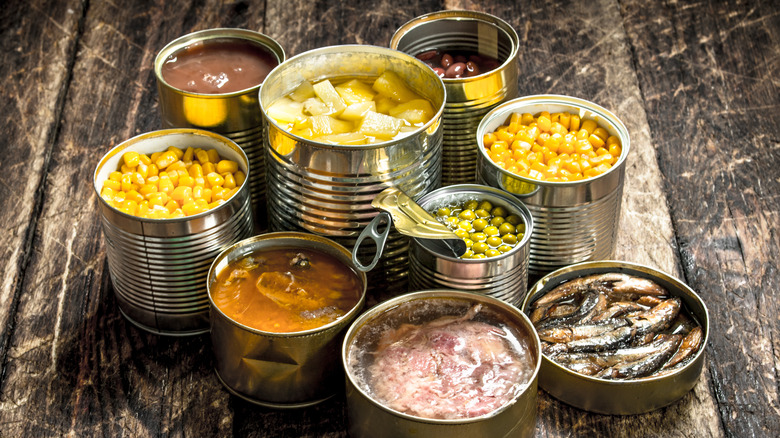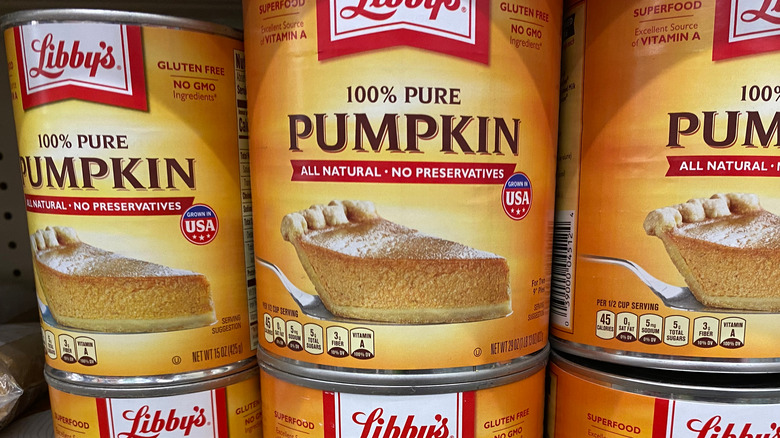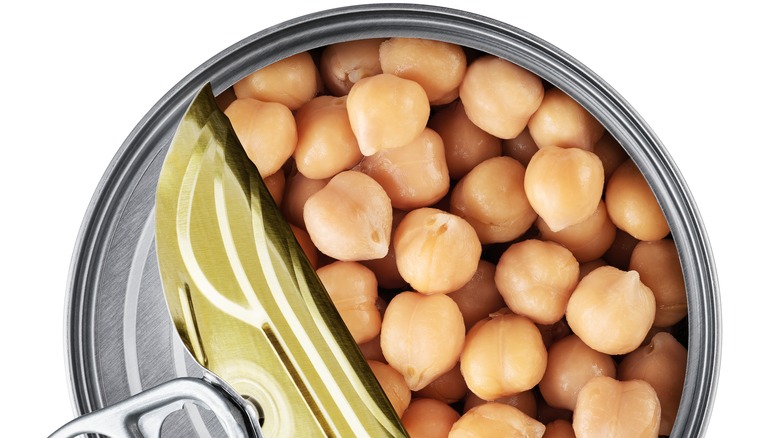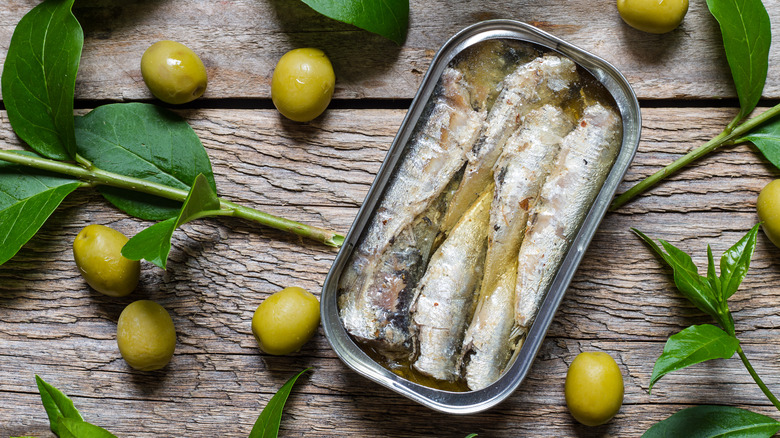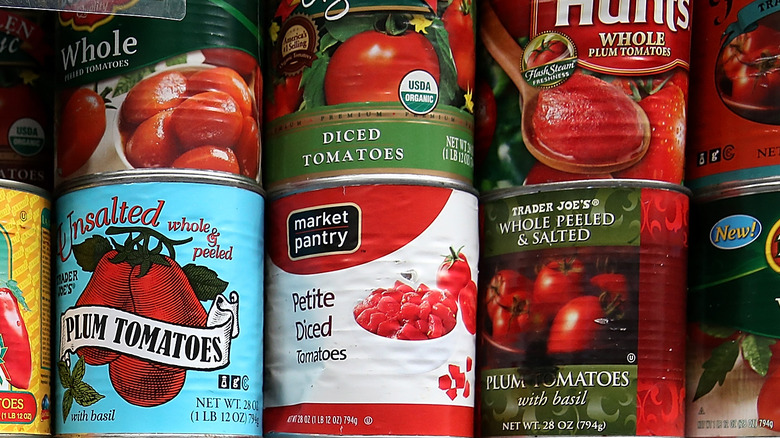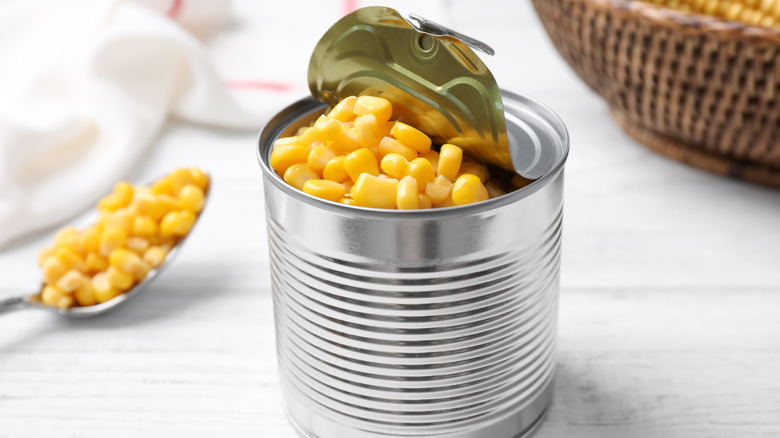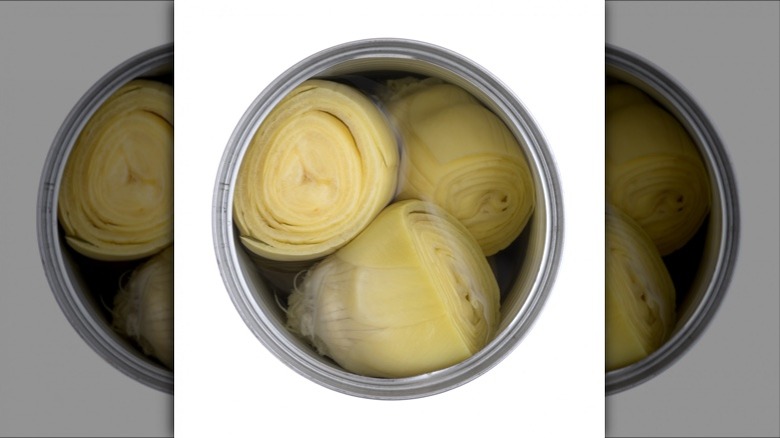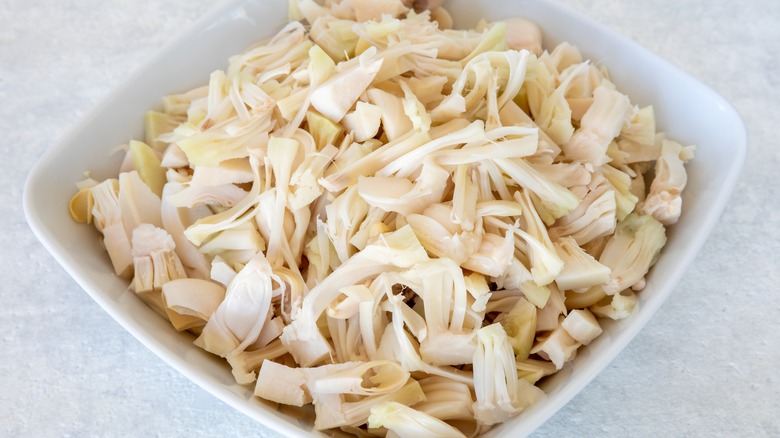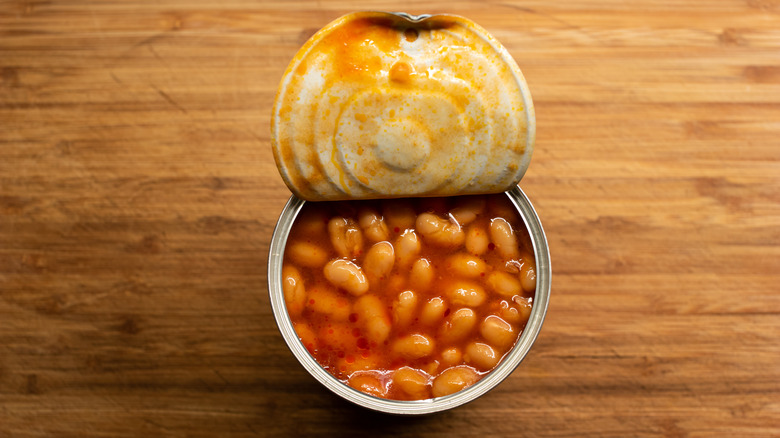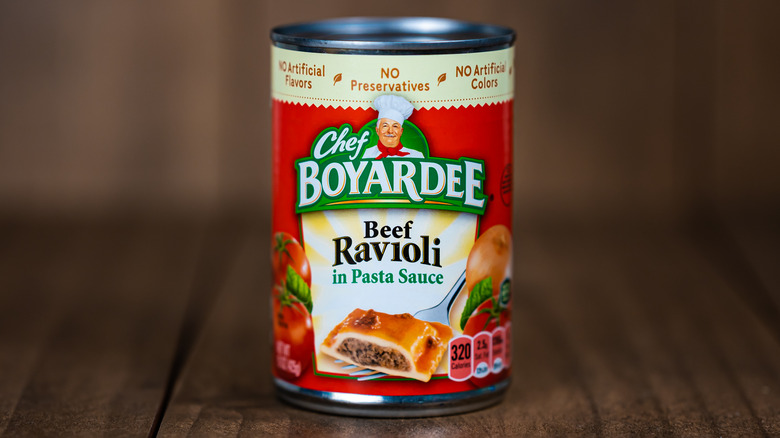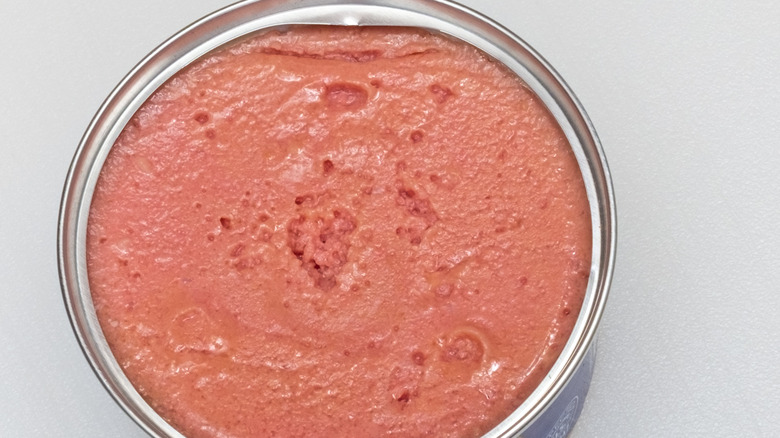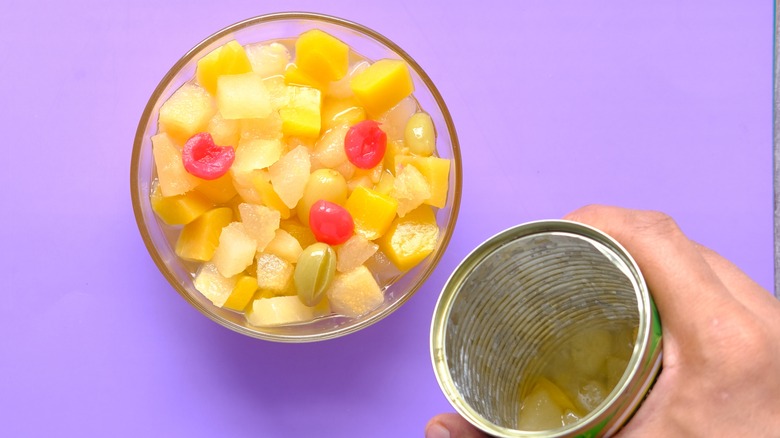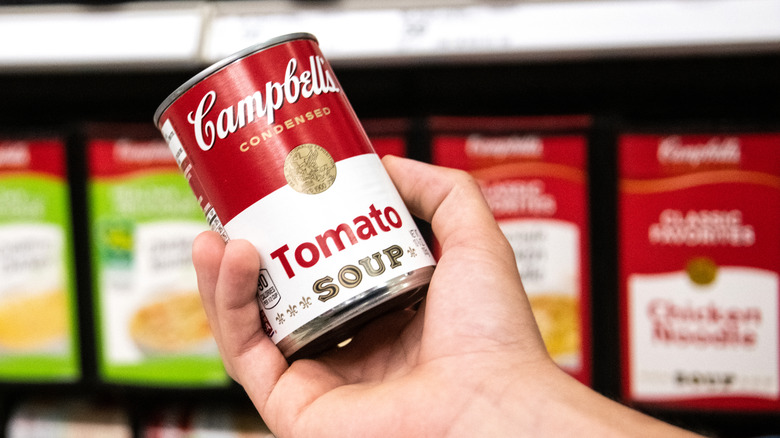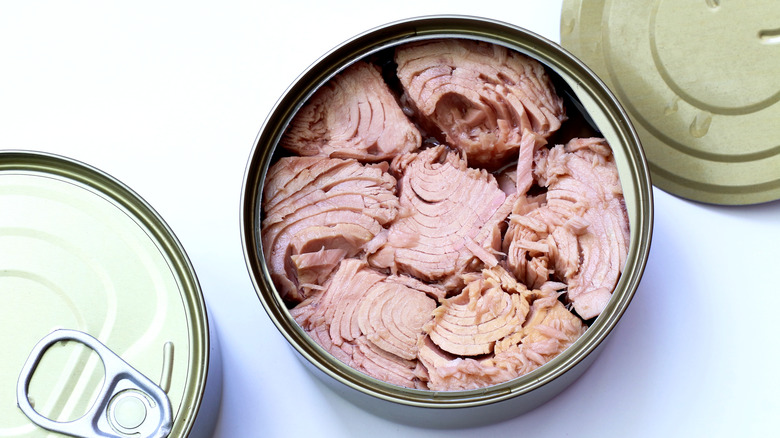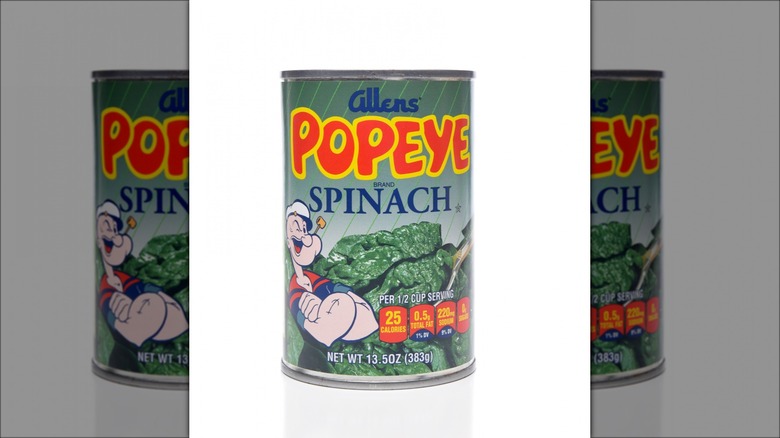7 Canned Foods You Should Buy And 7 You Shouldn't
Since its invention in 1809, as per Britannica, canning has been the mainstay for preserving food. Cans were once lined with BPA or bisphenol A, a chemical used to strengthen plastic. Decades of research showed a link between BPA and severe health issues, particularly for children (via Mayo Clinic). In 2012 and 2013, the FDA banned the use of BPA in certain products but stood by its claim that BPA was safe (per FDA). However, canned food is mostly BPA-free and can be enjoyed without worrying about exposure.
That's good to hear, since pretty much anything can be canned: meats, fish, vegetables, fruits, and even a whole chicken. The canning process involves heating the cans so that bacteria are killed and a vacuum seal is formed. Some foods don't degrade from that method of canning and keep their flavor, consistency, and quality. Other foods don't fare as well and can even be pumped full of sodium and sugar to improve their taste. So, which canned foods are worth your while, and which are best left to gather dust on the shelf? We've selected seven canned goods you should buy, and seven you shouldn't.
Buy: pumpkin
Canned pumpkin isn't just for pie or the myriad other goodies that proliferate in autumn. There are two types of canned pumpkin you'll find on supermarket shelves: pumpkin pie mix and pureed pumpkin. The last, according to Livestrong, is a powerhouse of nutrients and vitamins. There's some confusion as to whether canned pumpkin really is pumpkin, thanks to the USDA decision that canned "pumpkin" can include golden-fleshed squash. Canned pumpkin brand Libby's uses the Dickinson variety of pumpkin, an elongated, smooth-skinned varietal akin to butternut squash (via Southern Living).
The health benefits of canned pumpkins are impressive. In a one-cup serving, canned pumpkin has 7 grams of fiber (per OSF Healthcare), which the Mayo Clinic cites as essential for maintaining gut health and warding off heart disease and some types of cancer. Canned pumpkin is also loaded with beta-carotene, which improves vision and boosts your immune system, and other vitamins and minerals that help lower blood pressure and even assist in weight loss. If you're a dog parent, canned pumpkin is just as healthful for your fur baby and can help control their occasional gastric distress (via American Kennel Club).
Buy: chickpeas
Chickpeas, also known as garbanzo beans, are one of the most popular members of the legume family. They also have a real historic pedigree, having shown up in ancient writings in Turkey and France (via Harvard School of Public Health). Chickpeas are a staple in many cuisines and serve as the basis for hummus and falafel, as well as a variety of main dishes and salads. Not only are these golden gems delicious, but they also happen to be seriously nutritious. Chickpeas are packed with 14.5 grams of protein and 12.5 grams of fiber per one-cup serving (via Healthline) and provide 74% of your daily value of manganese, a mineral used to treat osteoporosis, arthritis, and post-menstrual syndrome, among other conditions (per Mount Sinai).
If that weren't enough of a nutritional benefit, numerous studies have proposed that daily consumption of chickpeas can lower your LDL ("bad") cholesterol, increase brain function, and reduce your risk of heart disease, cancer, and type 2 diabetes (via Healthline). Finally, when you open a can of chickpeas, don't immediately strain out the liquid, because that viscous stuff is liquid gold. Called aquafaba, it can be used as an egg white substitute for making both sweet and savory goodies, like meringue, mayonnaise, and macarons.
Buy: sardines
Other than anchovies, canned sardines get a bad rap when compared to other canned fish. But not only is this herring relative delicious, it's a bounty of stuff that's good for you packed four or five in a can. Mediterraneans have been chowing down on freshly-caught sardines for centuries, but the French first canned and exported them in 1824 (via Boutique de France). Their popularity spread throughout Europe, as did the need for preserved canned foods for soldiers. Sardines are cheap, come in assorted sauces and flavored oils, and can be dressed up with just a squeeze of lemon.
If you're still averting your nose from this "fishy" fish, consider the sardine's health benefits. As with many types of oily fish, sardines are high in omega-3 fatty acids that help prevent heart disease, blood clots, and high blood pressure (per Healthline). Sardines are very high in protein, minerals, and vitamin B12, which is an essential vitamin in our diets for supporting healthy brain function, nerve tissue, and red blood cell regeneration (via Medical News Today). According to the Mayo Clinic, sardines are also one of the few canned fishes that are low in mercury and are recommended for pregnant women.
Buy: tomatoes
Canned tomatoes are a staple of any well-stocked pantry. Picked and canned at their peak, they can be almost as juicy and flavorful as fresh ones. The canning process does affect their consistency, however, so canned tomatoes are best used in pasta sauces, pizza sauces, casseroles, and braises. According to Healthline, tomatoes are full of vitamin C, potassium, vitamin K1 (essential for bone health), vitamin B9, and lycopene. A powerful antioxidant, lycopene, is most concentrated in the tomato's skin, and the redder the tomato, the great amount of lycopene in the tomato.
Canning does leach out some of the tomato's vitamins and nutrients, but heating also increases the amount of lycopene and renders it easier to be absorbed in our bodies (via Healthwise). Likewise, byproducts of cooked tomatoes — juice, tomato paste, and ketchup — have higher levels of lycopene than fresh tomatoes. The positive effects of lycopene have been reported in hundreds of studies (per Annual Review of Food Science and Technology), and research strongly suggests that lycopene consumption can decrease the risk of heart disease and various types of cancer. Some canned tomatoes can have high levels of sodium, though, so look for brands that are processed with no salt.
Buy: corn
When in season, a fresh ear of corn bursts with sweetness and flavor. But how many times have you bitten into an ear of corn only to discover that it's dry and mealy? Canned corn is an excellent alternative because the veggie is plucked, shucked, and processed within minutes of being harvested. Corn is one of the more controversial veggies because of its high carb level and possible risks from being genetically modified (via Medical News Today). However, corn isn't the junk vegetable you might think. According to Livestrong, It's loaded with an array of B vitamins, antioxidants, and a bucketful of minerals in just half a can.
The canning process can diminish a vegetable's natural vitamins and minerals, but in corn's case, it doesn't lose much of its nutrients and is about as healthful as fresh corn, according to the Journal of the Science of Food and Agriculture. Some cans may be high in sodium, meaning it's a good idea to rinse the canned corn before eating it, according to Livestrong.
Buy: artichoke hearts
It must have taken a lot of courage and hunger for the first person who saw an artichoke to think "Hey, I could eat that!" If you've ever attempted to prepare a fresh artichoke, then it's apparent that an artichoke presents a real challenge. Yet despite its prickly exterior, the artichoke's heart is toothsome and delicious once cooked. But few of us have the time to clean several artichokes for a meal. Jarred artichoke hearts are often available marinated in oil and spices and can make for tasty appetizers. Meanwhile, canned artichoke hearts are packed in water and salt and can be used in many recipes.
Artichokes are low in fat and calories, high in fiber, and have especially high levels of antioxidants (via Healthline). Another plus: cooking fresh artichokes does not radically diminish their nutrients. In addition, by consuming a single artichoke, according to the National Foundation for Cancer Research, you'll get a whopping 25% of your daily requirement for vitamin C, which may be linked to reduced cancer risk. You'll also get about five to six artichoke hearts in a can, making them a great bargain, too.
Buy: jackfruit
Native to Southeast Asia, the jackfruit grows to gargantuan size, so cutting it up yourself will challenge your patience. Although it's often eaten ripe, canned unripe jackfruit (also called green jackfruit) can be used as a vegan meat replacement. When shredded, jackfruit's texture is like pulled pork. Because of its neutral flavor, jackfruit is a perfect vehicle for barbecue sauce or Mexican spices (via Providence). Nutrient-wise, jackfruit is low in calories and fat, while consuming one cup of the stuff will infuse you with a healthy dose of vitamins, minerals, and antioxidants (per Healthline).
As per Healthline, a serving of jackfruit has over 3 grams of protein. Although it's not quite enough for a fully balanced meal, jackfruit can be augmented with other protein sources, such as beans or cheese. Traditionally, jackfruit has been used to treat asthma, gastric distress, and ulcers, but there hasn't been enough scientific research yet to support these benefits. Because of its popularity, canned jackfruit is readily available as well. So, if you're thinking of trying out a plant-based diet, it's a great starting point.
Don't buy: baked beans
Often called a "superfood," beans have almost magical nutritional properties when it comes to tasks fighting cancer, lowering "bad" LDL cholesterol, and improving digestive health (via WebMD). Beans are low in fat, full of fiber, vitamins, minerals, and antioxidants, and are a staple in plant-based diets around the world. But that can of baked beans or barbecued beans pretty much negates all of the natural goodness of the humble ingredient. According to Healthline, baked beans are typically composed of navy beans that aren't always baked, and depending on the variety, are canned with tomato sauce, sugar, molasses, salt, and spices. If they're not vegetarian beans, then pork may be in the mix as well.
Normally, a can of regular beans is type 2 diabetes-friendly because of its low glycemic index, which helps your body balance its levels of blood sugar and insulin. With all of that added sugar, however, it's clear that baked beans do not belong on any diabetic's plate. In England, where the Brits love baked beans in tomato sauce, a 200-gram portion has almost as much sugar as it does fiber (BBC Good Food). Meanwhile, U.S. brands have 12 grams of sugar in a half cup, which accounts for 20% of the daily limit in a 2000-calorie diet. Baked beans are tasty, but the healthier option is to make them from scratch yourself and keep an eye on the sugar.
Don't buy: pre-cooked pasta
Chef Boyardee wasn't just a name on a can. He was actually a high-end chef who sold spaghetti-and-sauce kits to appease his many restaurant fans (via NPR). By the time Boiardi (the actual spelling of his name) sold his company to American Foods Inc., Chef Boyardee was churning out 250,000 cans a day. But it wasn't alone. In 1965, Campbell's Soup launched SpaghettiOs, a purportedly tidier way for kids to eat spaghetti and tomato sauce (via New York Times). Both types of canned pasta are cheap, convenient, and tasty —if you like gummy spaghetti in thickened sauce with mysteriously-derived meatballs. Personal taste aside, however, you definitnely need to read the label on canned precooked pasta before you purchase another can.
If you compare cans of Chef Boyardee and SpaghettiOs, both with meatballs, you'll see a remarkable similarity in ingredients. Both are sweetened with high fructose corn syrup, which, according to Cleveland Clinic, increases the appetite and contributes to obesity and type 2 diabetes. They're also packed with fat, sodium, and carbohydrates. Oh, and those meatballs? A main ingredient — prominent in many processed meats — is mechanically separated chicken, a paste made by forcing chicken bones through a sieve to collect any edible tissue (per USDA).
Don't buy: canned meat
We can thank Napoleon for canned meat. In 1809, French chef Nicolas Appert won a 12,000-franc award for inventing a method for safely preserving food for Napoleon's troops (via Smithsonian Magazine). All kinds of meat are canned today, but not all canned meat is of the same quality and taste. Spam is, of course, widely considered to be the king of canned meat (or at least the most recognizable example) and it has only six ingredients. But like all canned meats, it's high in calories, fat, and sodium (per Nutrition Value).
According to Healthline, you're gambling with your life by consuming any processed meat, which is linked to high blood pressure, heart disease, and bowel and stomach cancer. The absolute worst canned meat you could buy is potted meat, the primary ingredient of which is mechanically separated chicken, the paste made from anything considered edible on a chicken carcass. With 8.06 grams of saturated fat and 2,418 grams of sodium per 100-gram serving, not to mention high levels of sodium nitrite (via Open Food Facts), it's no wonder that canned potted meat is best left on the shelf.
Don't buy: fruit in syrup
In the play and film "Steel Magnolias," the character Truvy shares her recipe for Cuppa Cuppa Cake: a cup of flour, a cup of sugar, and a cup of fruit cocktail with syrup, served with ice cream to "cut the sweetness" (via Houston Press). It's a funny joke, but unfortunately, canned fruit in syrup is a poor choice health-wise. As per Healthy Canning, canning fruit is more complex than stuffing fruit into a jar and sealing it. The preferred "hot pack" method retains the fruit's natural juices, while the cheaper and easier "raw pack" method employs sugar syrup and also compromises the natural taste of the fruit.
The FDA has detailed guidelines for canned fruit cocktails but only for fruit canned in syrup. Canned fruit cocktail in heavy syrup has 150 calories and 37 grams of sugar in a one-cup serving. Fruit cocktail canned in juice, however, has only 56 calories and 13 grams of sugar.
Don't buy: some soups
Campbell's iconic red-and-white can is frequently found in kitchen pantries across the world. As per Men's Journal, canned soup can be a nutritious meal, but you need to read labels before you start congratulating yourself for choosing a healthy option. Canned soup is infamous for its high level of sodium. As recommended by the American Heart Association, sodium should be limited to 2,300 milligrams per day. But Campbell's Chicken Noodle Soup has 1,550 milligrams of sodium in a single-portion can. Campbell's and other brands do have low-sodium soups available, which are the better choice when it comes to controlling your sodium intake.
Also be cautious with cream-based soups, like New England clam chowder. No doubt you expect chowder to have high-fat cream or milk, but in Progresso's chowder, the primary ingredients are soybean oil and modified food starch, a thickener. These are accompanied by cream and butter, which are way down on the list and account for fewer than 1% of total ingredients (per Fooducate).
Don't buy: albacore tuna
The FDA and the EPA advise two or three 4-ounce servings of fish per week (via EPA), but tuna is not always the best choice. According to Healthline, larger fish, like albacore tuna, have high levels of methylmercury. Exposure to this can have a detrimental effect on brain function and may even lead to cognitive disorders with serious or long-term exposure (per Medical News Today). Pregnant people, breastfeeding mothers, and young children are most susceptible to mercury poisoning. The FDA still recommends that pregnant women consume eight to 12 ounces of fish but should avoid albacore tuna, which has three times more mercury than chunk light canned tuna.
Chunk light canned tuna generally contains skipjack, a much smaller tuna species with a relatively short life span. Skipjack, therefore, doesn't have as much mercury as albacore because it simply doesn't eat as many other fish for as long a lifespan. Skipjack tuna is also considered to be a "smart seafood choice" because it's sustainably maintained and harvested (per NOAA).
Don't buy: green vegetables
According to Insider, there really is a nutritional difference between canned green vegetables and fresh or frozen ones. Chef Barry Tonkinson, VP of Culinary Operations at the Institute of Culinary Education, is a fan of certain canned vegetables, which can make some recipes more accessible. Yet they're not all wins. Tonkinson claims that the big failure in canned foods comes from green vegetables. Because of the high heat needed for canning, green vegetables — in particular, green beans, asparagus, and peas — suffer the most from the process. This ultimately means that they lose nutrients and flavor.
Manufacturers often try to compensate for this loss by adding salt and sugar (via UCLA Health), which doesn't exactly up the health value of the can's contents. A one-cup serving of canned spinach, for example, has 689 milligrams of sodium (per Nutritionix), while the same size serving of frozen spinach has only 184 milligrams. Likewise, one cup of canned asparagus has 695 milligrams of sodium, or 30% of recommended daily value (via Nutrition Value), compared to frozen asparagus with a meager 4.6 milligrams. We get that sometimes canned vegetables are more available than frozen or fresh, but this health differences are stark. Even if we set the sodium issue aside, does anyone really enjoy the mushy consistency of canned asparagus?
